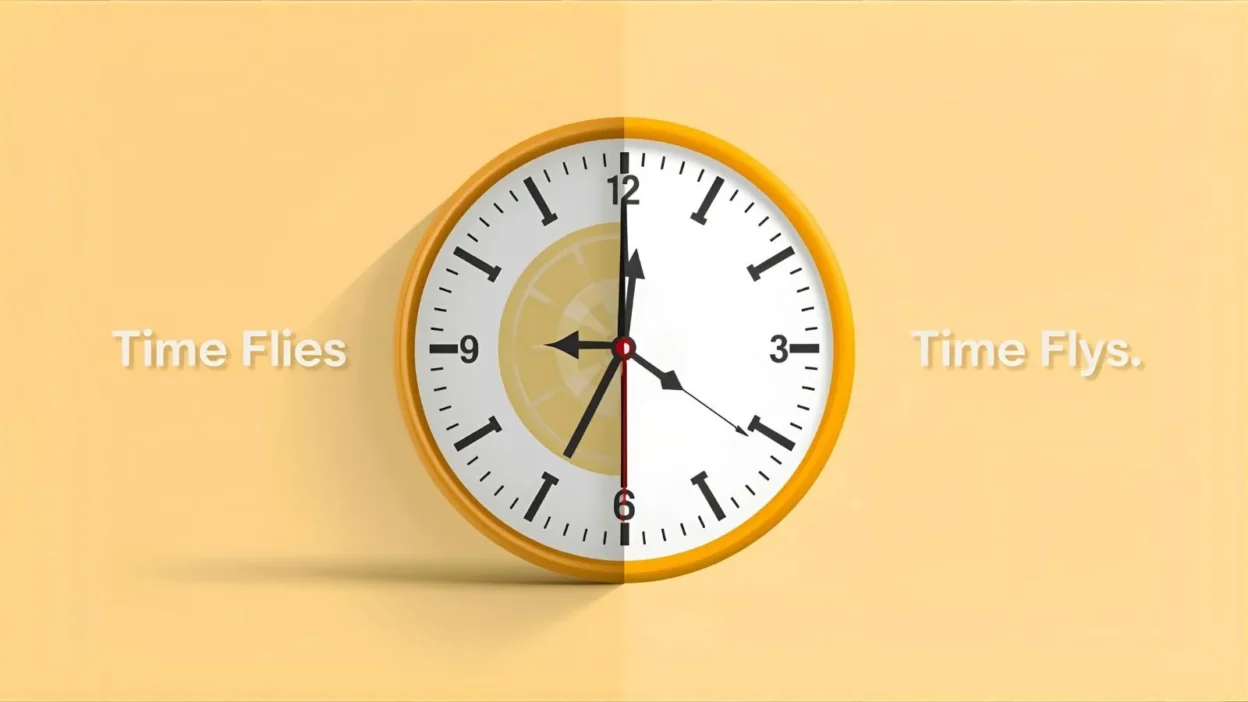Have you ever written “Time Flys” and wondered if it looks right? You’re not alone — this is one of the most common spelling mistakes in English!
If you care about writing correctly, whether for school, work, or social media, this quick guide on “Time Flies or Time Flys” is for you.
Let’s clear up the confusion in seconds!
Time Flies or Time Flys – Quick Answer
The correct spelling is “time flies.”
- Correct: Time flies when you’re having fun.
- Incorrect: Time flys when you’re having fun.
“Flies” is the third-person singular form of the verb fly. “Flys” is not a standard word in English.
The Origin of Time Flies
The phrase comes from the old Latin expression tempus fugit, meaning “time escapes” or “time runs away.” English speakers later translated it into the familiar saying “time flies.”
The confusion comes from English verb endings. Most verbs form their third-person singular with “–s” (e.g., runs, jumps). But verbs ending in –y often change –y to –ies (e.g., flies, cries). That’s why “flies” is correct.
British English vs American English Spelling
Unlike words such as travelled/traveled or colour/color, there is no difference between British and American English in this case. Both use “time flies.”
| Version | UK English | US English | Correct? |
| Time flies | ✅ | ✅ | Correct |
| Time flys | ❌ | ❌ | Incorrect |
Which Spelling Should You Use?
- US audiences: Always write “time flies.”
- UK and Commonwealth: Same — “time flies.”
- Global writing (emails, blogs, news): Stick with “time flies.”
There’s no variation across regions. The only correct form worldwide is “time flies.”
Common Mistakes with Time Flies or Time Flys
- Writing time flys instead of time flies.
- Thinking “flys” is a simplified modern spelling.
- Mixing it with the plural of fly (the insect), which is also flies.
- Assuming British English uses flys like it does travelling/traveling.
Correction: Always remember the verb rule — fly → flies.
Time Flies in Everyday Examples
- Emails: “Wow, time flies! I can’t believe it’s been a year since our last meeting.”
- News headlines: “Time flies for Olympic athletes preparing for the next games.”
- Social media: “Can you believe summer is almost over? Time flies!”
- Formal writing: “As the saying goes, time flies, and we must use it wisely.”
Time Flies or Time Flys – Google Trends & Usage Data
Search data shows that “time flys” appears often, but it is always a misspelling. People search it because they are unsure.
| Search Term | Popularity | Correctness | Notes |
| Time flies | Very high | ✅ Correct | Used globally in writing/speech |
| Time flys | Medium | ❌ Wrong | Common error in searches/posts |
FAQs
1. Which is correct: time flies or time flys?
Time flies is correct. Time flys is incorrect.
2. Why do people write “time flys”?
Because many English verbs add “s,” but verbs ending in y change to ies.
3. Is “time flys” ever acceptable?
No, not in formal or informal writing. It’s always a mistake.
4. Does British English use “time flys”?
No. Both UK and US English use “time flies.”
5. Is “flies” also the plural of the insect fly?
Yes. The word flies can mean both insects and the verb form.
6. Can I use “time flies by”?
Yes. “Time flies by” is a common extended form of the phrase.
7. What does “time flies” really mean?
It means time passes quickly, often without noticing.
Conclusion
When it comes to “time flies or time flys,” the answer is simple: “time flies” is always correct. The word “flies” follows standard English grammar rules for verbs ending in –y.
The mistake happens because many people think adding just an “s” works for all verbs, but that’s not true here. Unlike other spelling differences between British and American English, this phrase does not change — both sides of the Atlantic agree.
Whether you’re writing a casual text, a business email, or a professional article, always choose “time flies.” It shows attention to detail and avoids embarrassing errors. Remember: time flies, mistakes don’t.

Hi, I’m Jason Carter, the author behind GrammarNestly.com.
I’m a grammar expert with a passion for helping readers understand the English language in a simple and practical way.
I love breaking down confusing grammar rules and turning them into easy, everyday lessons that anyone can follow.



